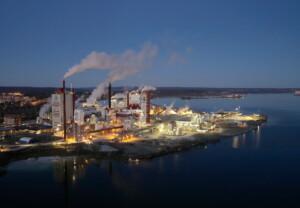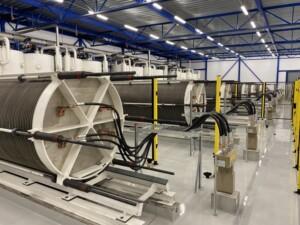5 key takeaways for the Pulp & Paper industries
The pulp and paper industries are undergoing a transition, playing an increasingly important role in the non-fossil society. Adven attended Pulp & Beyond 2024 fair which revolved around carbon neutrality and maximizing the potential of every part of the tree, shaping the forest-based bioeconomy.
As Adven wants to make difference in a world of change, Industry Lead Louise Kierkegaard and Sales and Business Manager Joni Kalapudas have gathered five key takeaways from the event connected to concrete examples.
Key takeaway #1: More value and efficiency out of wood
Increased focus on getting more value out of wood will change pulp mills energy balance in the future. This means that energy efficiency and heat recovery opportunities should be utilized.
Adven has been recovering waste heat from industrial users to facilitate system level integration between own operations – one example being a 40-years long partnership with SCA in Timrå, Sweden.

Key takeaway #2: Maximize circular economy so nothing goes to waste
Utilization of production side and waste streams are gaining more attraction as pulp and paper producers are having zero waste targets.
When the world’s leading producer of abrasives Mirka produces abrasive paper at its plant in Jeppo, Finland, by-product streams are generated in the production when the paper is cut to size. Adven utilizes those waste pieces and combusts energy out of them which is then utilized again in Mirka’s production.
Key takeaway #3: New opportunities with forest-based bioeconomy
The forest-based bioeconomy market is developing, which will create new business opportunities where partnerships are utmost important.
Adven’s Energy as a Service® partnership with crude tall oil biorefinery producer Fintoil in Hamina, Finland, is a successful example of outsourcing energy production in the green field biorefinery investment.
Key takeaway #4: Taking most out of biogenic CO2
Capturing of biogenic CO2 is a hot topic in pulp mill environment and can be utilized for example in hydrogen production which creates a lot of excess heat.
Adven’s long-term partnership with steel company Ovako in Hofors, Sweden, will take a leap forward when we will start utilizing the residual heat from Ovako’s electrolyzers in our Hofors district heating network during this year.

Key takeaway #5: Looking for closed cycle solutions
Pulp and paper mills are looking for closed cycle opportunities to decrease the footprint of production.
Adven has implemented two closed water cycle projects for Nammo’s propellant plant in Vihtavuori, Finland, making it possible for the plant to cut its consumption of cooling water in half while at the same time achieving substantial energy savings.
Contact us and let’s discuss more!
Louise Kierkegaard
Industry Lead, Pulp & Paper
+46 72 73 15 557, louise.kierkegaard@adven.com
Joni Kalapudas
Sales and Business Manager, Pulp & Paper
+358 40 840 6580, joni.kalapudas@adven.com

 Newsletter
Newsletter